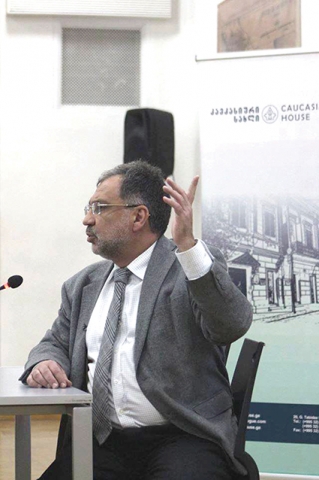George Derlugian: US Importance Overestimated in Caucasus
December 20-22 put many an academic and scientist in Tbilisi in a festive mood when Caucasian House, a local NGO focusing on regional dialogue, invited George Derlugian, a world-renowned sociology professor, to Georgia to give three days of public lectures in Tbilisi State University. GEORGIA TODAY, together with Iberia TV’s Panorama Talk Show, was privileged to get an interview with the esteemed scientist and researcher, who has published numerous books and publications on the Caucasus, Post-Soviet space and the Middle East.
The world is in shock following the assassination of the Russian Ambassador to Turkey, and experts and opinion-makers have already said that this incident will further embolden Russia to carry out its narrative in the region.
Russia is trying very hard, as it always has. It compensates its economical weaknesses it has been enduring the last 300 years with smart and often very daring maneuvers, by interfering in the areas where the West is too weak or unwilling to play its hand. And while it works to a point, it remains to be seen how long this game will continue. The real question here is about whether the US hegemony will be further diminished, as it has been weakening over the last decade. It’s fair to say that the US left Iraq defeated, defeated by their ambitious plan of continual presence in the Middle-East and transformation of what is the world’s most volatile geopolitical region. That’s what allowed Russia to enter the game and while they’re successful on a short term basis, it remains to be seen whether they are resilient enough for a long-term approach.
Do you think Trump’s presidency will spell further diminishing of US hegemony in the region? Do you foresee any sort of Pan-Arabian alliance?
No, I don’t see Muslim countries putting aside their differences any time soon. States and people unite when they have ideology, and we happen to live in a world which is post-ideological. As for Trump, he is a deal-maker, a businessman. It’s very difficult to predict his next move and he has made it the staple of his policy- keeping everyone guessing. Look at him: he’s friends with Vladimir Putin and he used to be friends with Mikheil Saakashvili. What do you make of a politician who’s friends with both? The problem with Trump is that his policy is bound to be rife with contradictions. It will be a very forceful, very self-serving policy, “What can you give us if we do this?” This is a great reversal to the previous approach of basically free aid. It will be very much dictated by profit-making; be it money, or troops, in matters of defense. So, in this respect, Trump’s policy in the Middle East or even here is quite calculable already. They will support anyone who helps fight their wars and cut costs in this region, be it even the Taliban. If they’re able to put order in Afghanistan, why not? To hell with it! Anyone who helps us forget Afghanistan will become an ally. Israel will get a free hand. This will apply to Russia and many other states, who’ll be allies, but only on the short-term. These are not ideological friendships.
And, in the end, what does this spell for the Caucasus region?
Here in the Caucasus, as it happens in the Balkans and many other states, you overestimate the US importance. The reality is that many countries now are beyond the horizon. The Caucasus is quite a small place, both geographically and demographically. We typically say that the Caucasus is the bridge between East and West but it also means that you are in the backyard of everyone – Turkey, Iran, Europe and, of course, Russia. So, ask yourself – What will be the brutally pragmatic policy for the US and Europe in this region? That’s what Trump’s administration is going to do. Do they want to get involved in Karabakh? Do they want to get involved in Abkhazia? Do they want another poor country in the European Union? Bulgaria and Romania went in very unnoticed, as EU officials say in private talks, but this is not going to happen again. So, you have to prepare for a brutally pragmatic world which operates on profit, which operates on short term alliances and the aftermath of Trump’s election and Brexit.
Vazha Tavberidze












